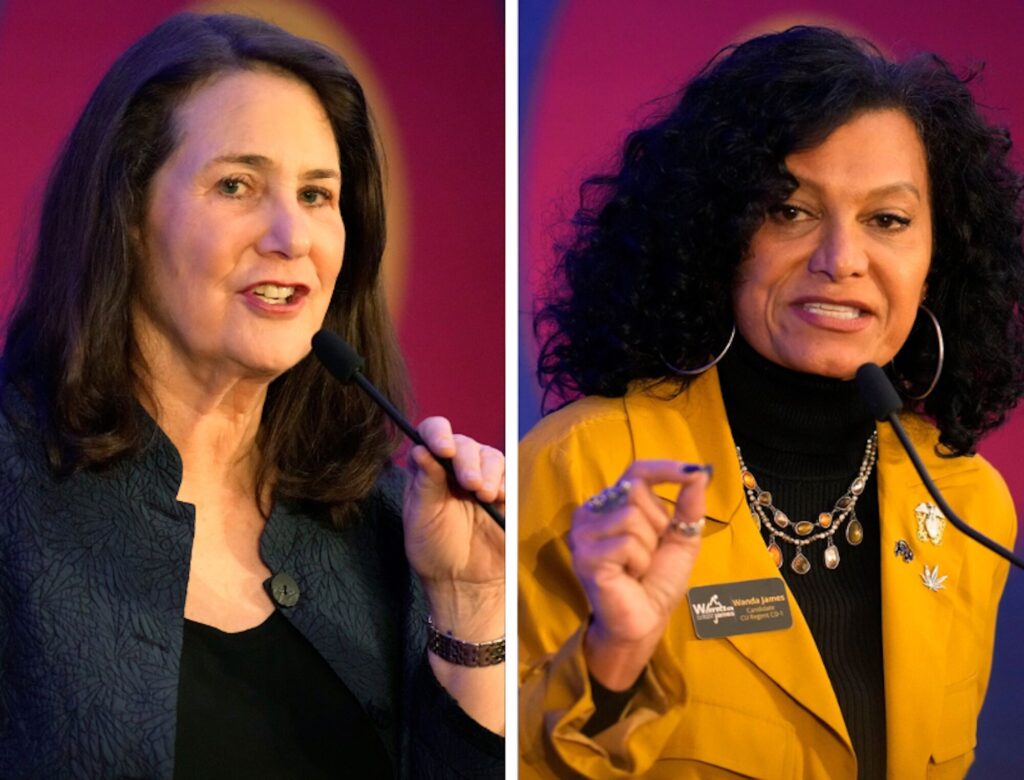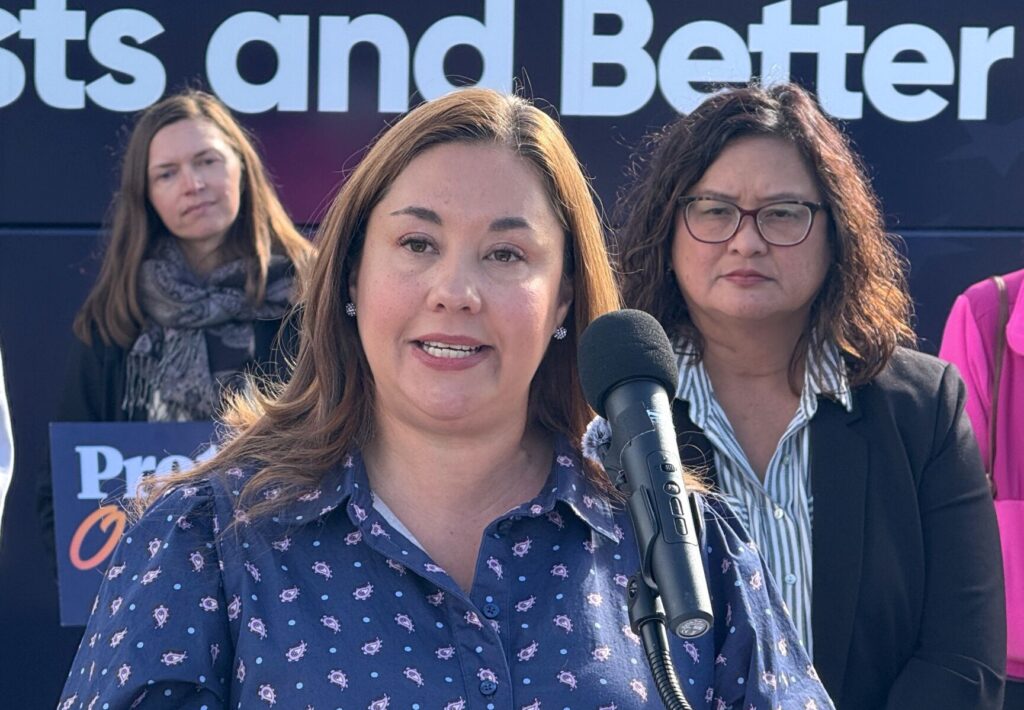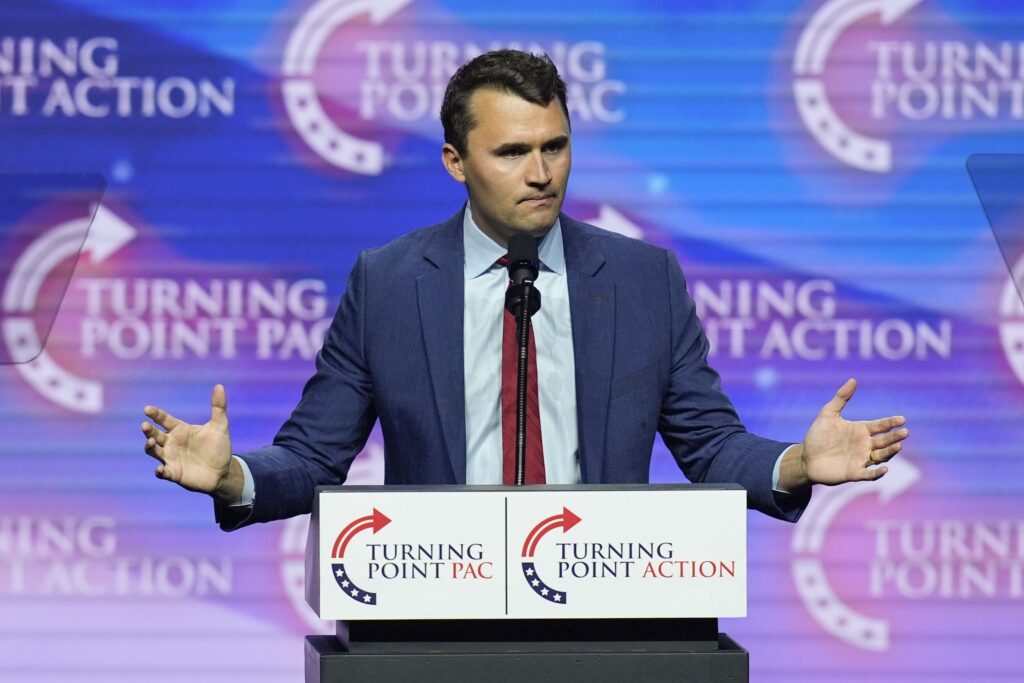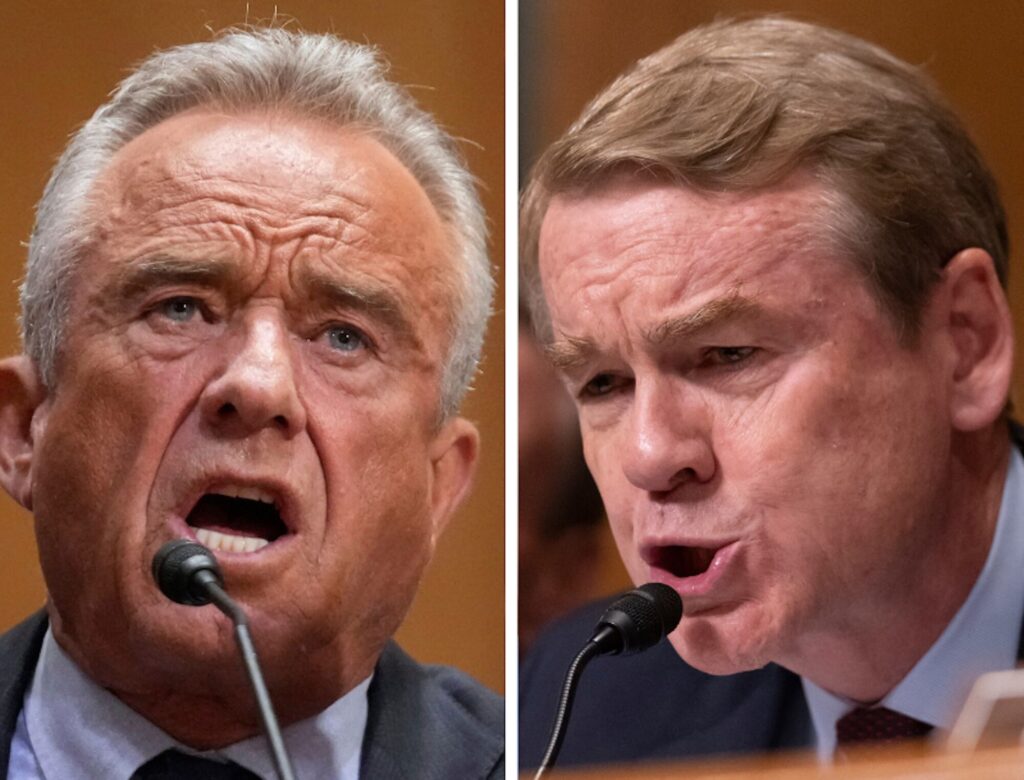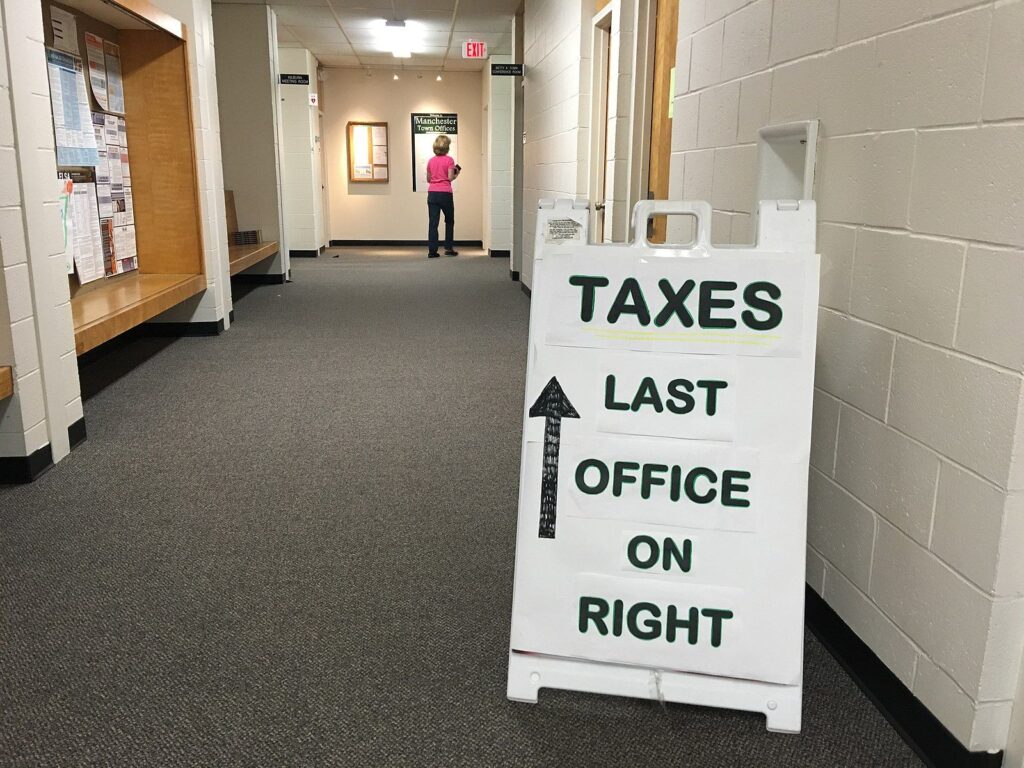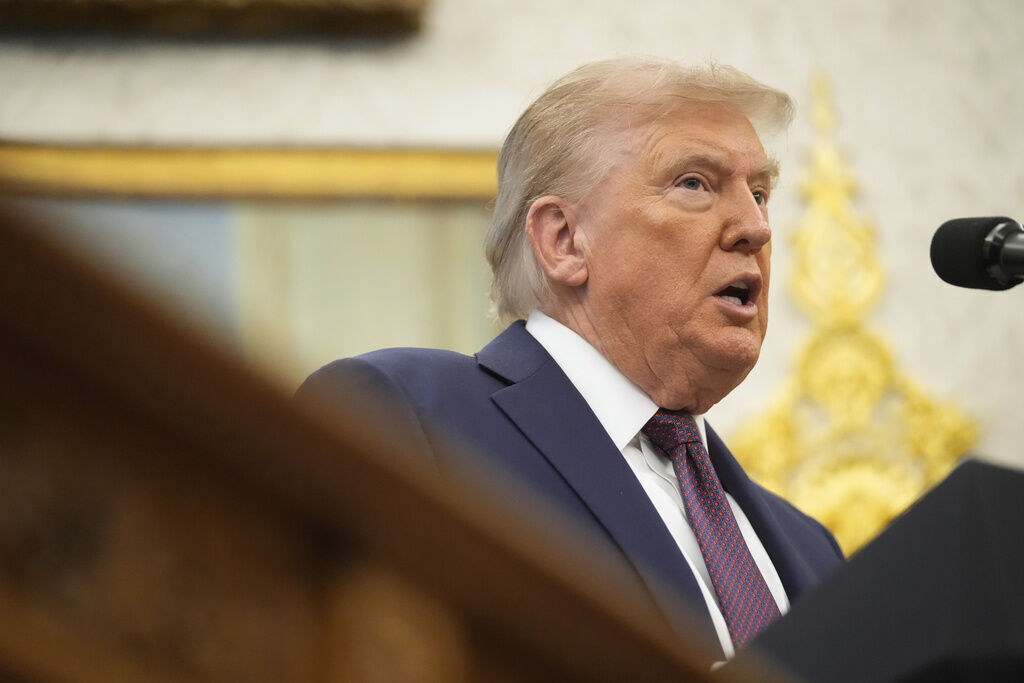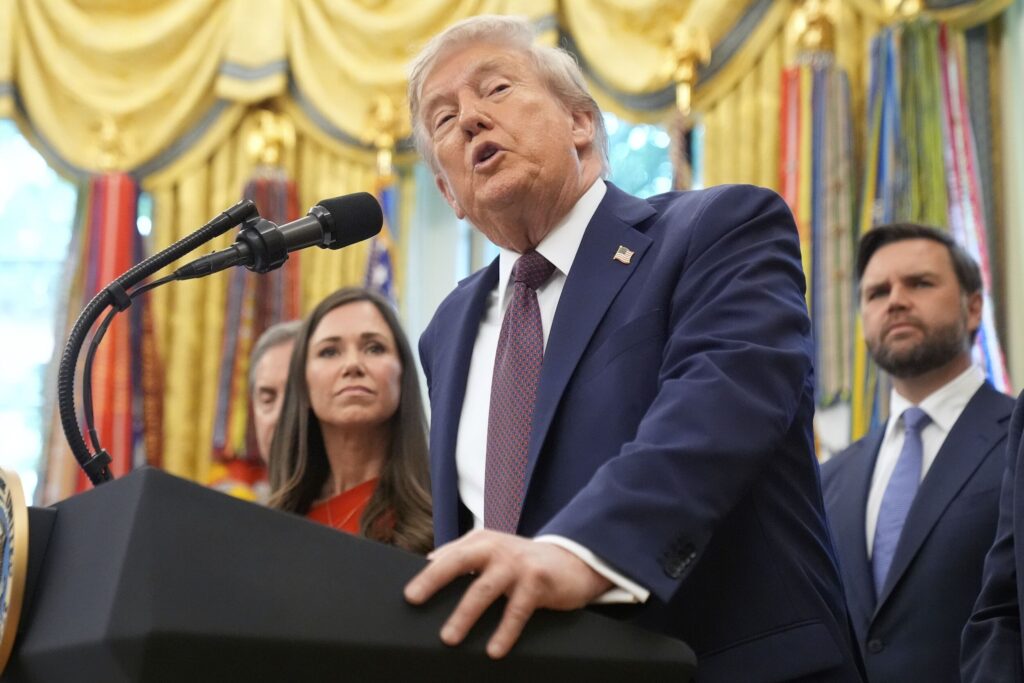Q&A with Colorado lawmaker Barb Kirkmeyer | Republican says she’ll be a governor who ‘knows how to govern’
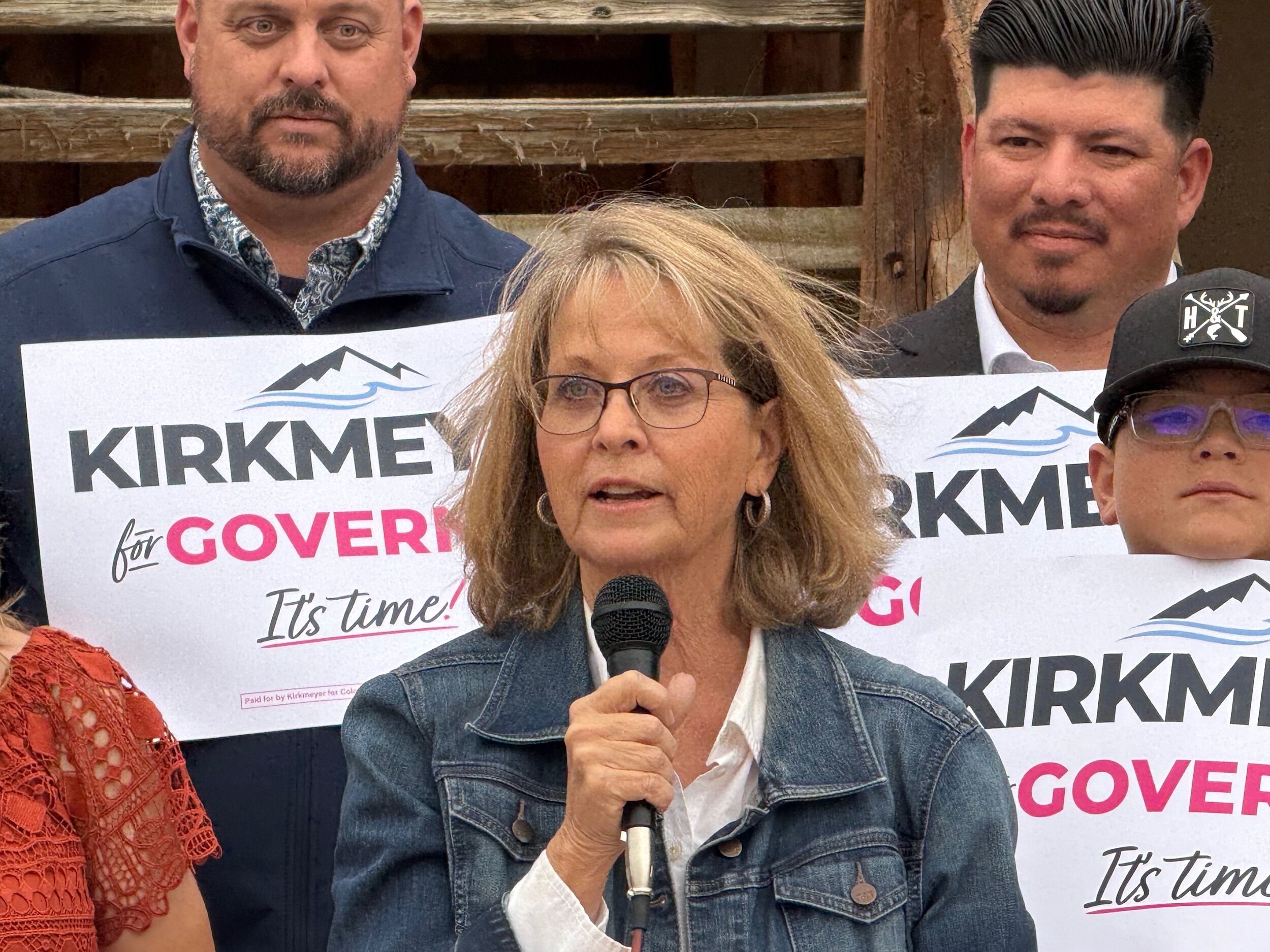
State Sen. Barb Kirkmeyer says her decades of experience in government — as a county commissioner, director of a state department and state legislator — have prepared her to be a “really great governor,” and the Brighton Republican argues that’s what it’ll take to pull Colorado out of the tailspin she says it’s in.
The 66-year-old dairy farmer and fourth-generation Coloradan last week joined a crowded primary field of Republicans hoping to replace term-limited Democratic Gov. Jared Polis after next year’s election.
Surrounded by supporters inside the adobe walls of historic Fort Lupton on Sept. 9, Kirkmeyer kicked off her campaign under a blanket of heavy, dark clouds that threatened rain, lending a dramatic backdrop to the grim picture she painted.
“I’ve talked to Coloradans across the state who are tired of feeling like they live in a state of inevitable decline, high crime, runaway spending and budget deficits, crumbling roads and underperforming schools,” Kirkmeyer said.
“Quite frankly, we’re unaffordable, we’re unsafe, and the state’s unraveling. Decline is a choice. It is not a foregone conclusion. Bad decision-making by lawmakers got us into this mess,” she added. “The flip side is that good decision making can turn things around — and it’s time.”
Kirkmeyer is serving her second term representing Senate District 23, which encompasses parts of Weld and Larimer counties, and sits on the powerful Joint Budget Committee. Prior to her election to the legislature, she logged nearly two decades as a Weld County commissioner in non-consecutive terms, starting in 1993. She also ran the Department of Local Affairs under Republican Gov. Bill Owens, the state’s only GOP governor in the last five decades.
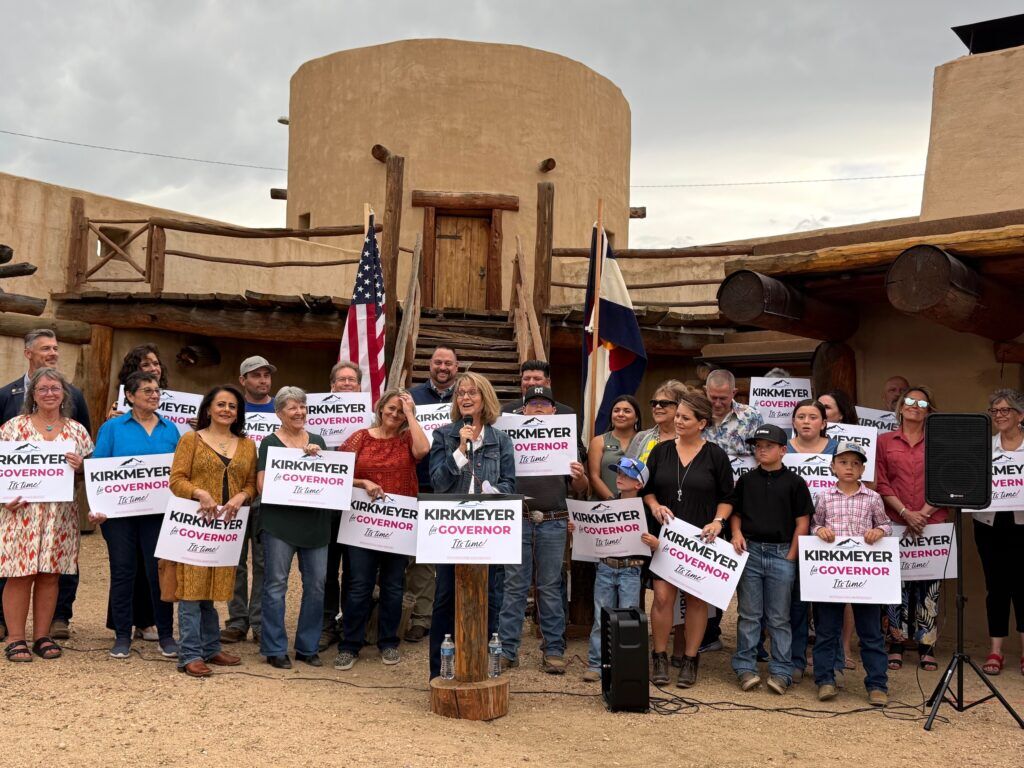
In 2022, Kirkmeyer narrowly lost a bid to represent the newly created 8th Congressional District, falling less than a percentage point behind Democrat Yadira Caraveo in one of the closest congressional races in the country that cycle.
Another 15 Republicans have launched gubernatorial candidacies, including former U.S. Rep. Greg Lopez, a former Parker mayor making his third run for the office; state Sen. Mark Baisley, R-Woodland Park; state Rep. Scott Bottoms, R-Colorado Springs; Teller County Sheriff Jason Mikesell; former congressional hopeful Joshua Griffin; and wealthy trail attorney Will McBride.
On the Democratic side, two of the state’s leading elected officials — three-term U.S. Sen. Michael Bennet and term-limited Attorney General Phil Weiser — are battling it out in their party’s primary.
Addressing the state’s leftward tilt in recent decades — Colorado hasn’t elected a Republican to statewide office since 2016 and hasn’t elected a Republican governor since 2002 — Kirkmeyer said she doesn’t believe that voters are primed to only elect Democrats.
“Colorado is ready for a new direction,” she said in her announcement. “It’s ready to chart a new path. It’s ready for a common-sense, conservative leader who will roll up her sleeves, work with people and deliver real results, not play political games.”
Colorado Politics spoke with Kirkmeyer on Sept. 7 about her impending run, two days before she formally entered the race. The interview has been lightly edited for length and clarity.
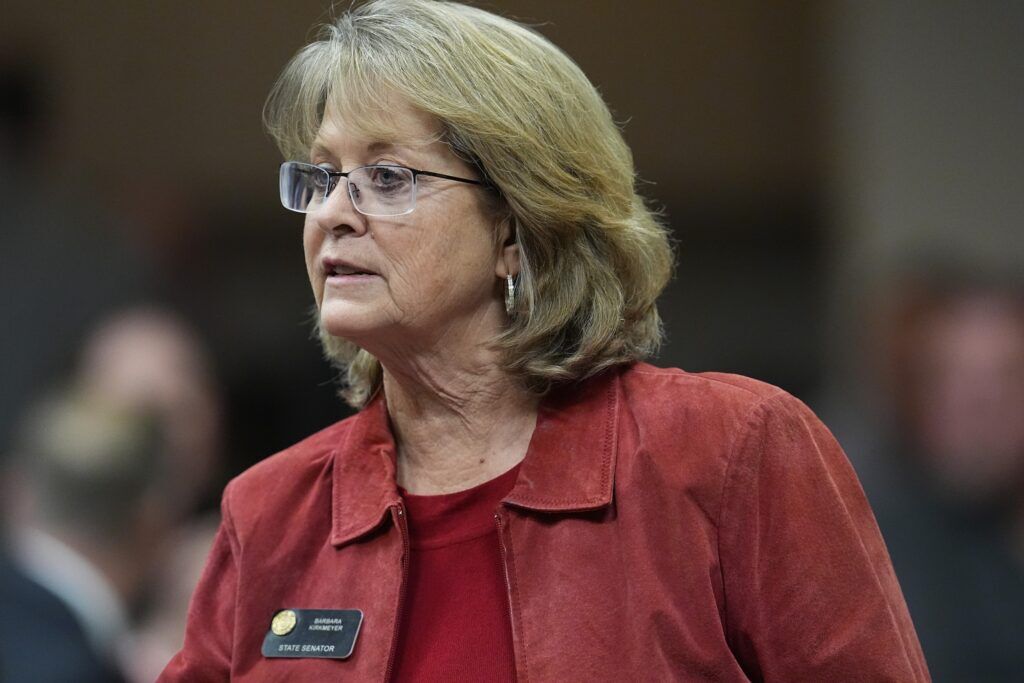
Colorado Politics: Why did you decide to run for governor?
Barb Kirkmeyer: You know, it is just time. It’s time that we get a governor who actually knows how to govern and that believes that Colorado’s best days are still ahead of us, and I’m that person, you know? I’m a mom, a grandmother, life-long Coloradan — in fact, I’m a fourth generation Coloradan. I love this state, I love the people in it, and I think we deserve better, and we can do better.
CP: You’re jumping into a very crowded primary — you’ll be the 16th Republican candidate for governor. What sets you apart from the other 15 already running?
Kirkmeyer: Look, my experience and my background lends me to be a really great governor, and it does distinguish me from all the other candidates. I grew up poor, grew up on a dairy farm in northern Jefferson County, owned a dairy farm and a small business — a floral shop — myself, so I have an agricultural background, have that small business background. And then I started off in local government. I came up through the ranks as a county commissioner, was able to lead my county and lower taxes, build roads — got really engaged in a lot of things, from transportation to public safety to health care and taking care of low income kids that are in child welfare services.
So I think all of that lends really good background and experience that I have. And then being on the Joint Budget Committee for the last three years and a state senator for the last five years now, again, it’s experience that I don’t think anyone else has. I also don’t believe anyone else has the list of accomplishments or the record that I have of getting things done — I did this twice, within a four month period, had the largest property tax reduction in history, right, with Senate Bill 233, and then with the special session bill, came back and did it again. I was told that I’d never get the third lane put on I-25 north, and you know what, they’re getting ready to finish it up. So my experience in transportation, property taxes, just balancing the budget, taking my county to zero debt, leaving it at zero debt, and then also reducing the mill levy. Those are things that I don’t think anybody else in this field has.
So my experience in transportation, property taxes, just balancing the budget, taking my county to zero debt, leaving it at zero debt, and then also reducing the mill levy. Those are things that I don’t think anybody else in this field has. — Barb Kirkmeyer
CP: In the special session, you and your fellow Republican legislators said the state has been over-spending in recent years, and that’s a reason that Colorado faces this budget crunch. Where would you cut spending, which programs and by how much?
Kirkmeyer: First of all, I worked for a governor — I was, at one point, the executive director of the Department of Local Affairs — and when I first went to work there, Gov. (Bill) Owens was the governor. Within about a two- or three-month period there in 2001, he required us to do a 14% across-the-board cut. That is one of the things this governor has not done. I mean, we need a governor who knows how to govern. This is what I’m talking about. He should have been looking at reducing and cutting spending within the departments.
As a Joint Budget Committee member, we have to balance the current law, as a legislative branch, but the governor doesn’t have to spend to that. So the governor has every ability to cut spending, to look at programs that aren’t working and saying, ‘Hey, we’re going to put a pause on those, and we’ll go back in the legislative session and do what we need to do. But for now, we’re going to put a pause on those.’
I will tell you, one of the first things that I would cut — and this may sound kind of trite — but I would cut the Office of Saving People Money, because I don’t know of one dime that it’s actually saved anything, other than it’s given the lieutenant governor a second salary, and I just don’t think that’s right. So that would be the first office I would cut.
Then there are three offices over there in the Colorado Energy Office that basically do the same thing as the energy office. I don’t know why we need an office of climate preparedness, an office of sustainability and an office of environmental justice, when we already have an office of energy conservation, and those three offices basically do the same thing that that office is supposed to be doing. So it’s just bureaucratic bloat that has happened.
And then also, just so we understand this, over the course of the last seven years in this governor’s administration, we’ve increased full-time employees by over 7,000 employees in seven years. Now, the governor does have to sign off on the budget, but granted, there’s maybe 3,500 of those employees that were in higher education, but in the governor’s executive branch, there’s been 600-700 new employees every year. I just don’t think that’s necessary. And I think there’s areas there we can look at, and there’s new programs that have been started that we should be looking at and probably should have paused and never even started.
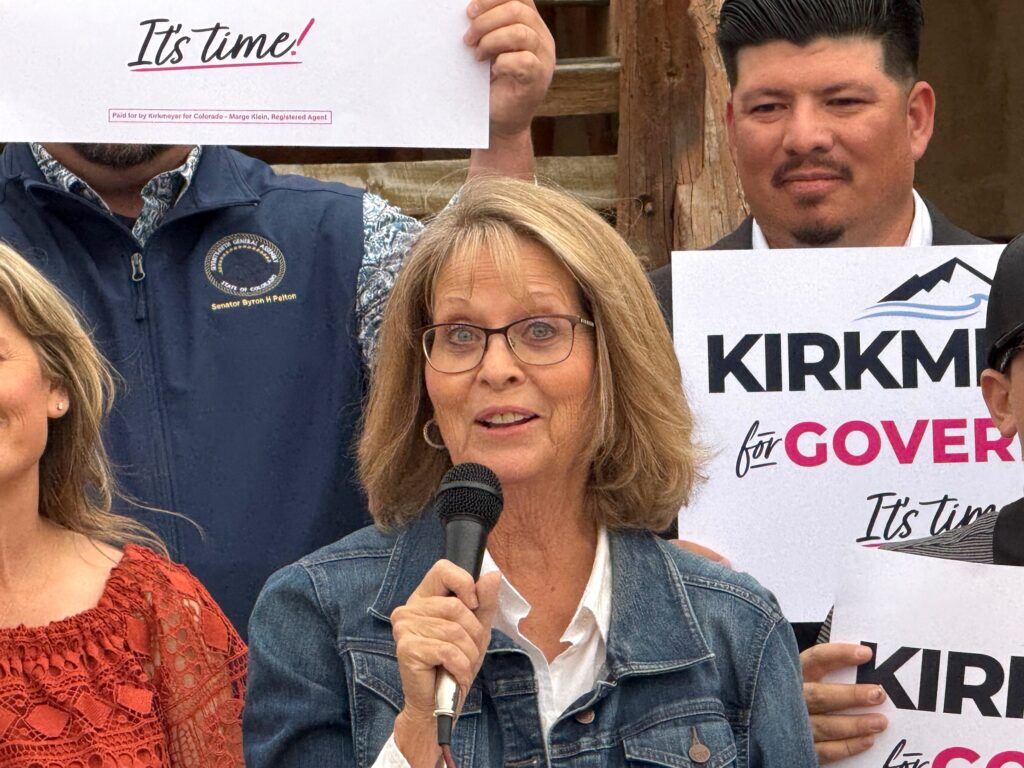
CP: When you’re talking about eliminating some of those offices, you’re talking about saving, what, hundreds of thousands of dollars each year, but you’re looking at a $200 million budget gap?
Kirkmeyer: It’s in the millions.
CP: But how would you close the $200 million budget gap?
Kirkmeyer: So some of the things that I proposed last year that didn’t go through, one of those is that we should sunset every cash fund. So we’re trying to fill the gap on the general operating fund, right? But we have a lot of cash funds, and then we get federal funds — that’s what makes up that $44 billion budget. I suggested that we sunset every cash fund, because there are a lot of general funds in those cash funds. And let’s find out exactly what is in those cash funds. Some of those cash funds were started 30 years ago — are those programs still really viable programs? So I think there are things like that, kind of across the board, that we could do, but quite honestly, we’re going to have to really dig into this budget.
One of the first things that I would cut — and this may sound kind of trite — but I would cut the Office of Saving People Money, because I don’t know of one dime that it’s actually saved anything….
— Barb Kirkmeyer
There aren’t a lot of big items that we can be looking at, that have a lot of general fund money in them, so we’re going to have to dig into it and do a strategic look at, where do we make these cuts? And you know, the governor’s office should be helping with that, the governor’s staff should be helping with that, instead of just putting up roadblocks all the time. But so there are areas like that that I would be looking at.
And like I said, across the board — there’s no reason why these departments aren’t cutting just across the board, 10%. Now, I would not be cutting the Department of Education. I would not be cutting Medicaid. In fact, I can’t believe that the governor cut Medicaid provider rates at a time when our health care infrastructure is in crisis mode, and when you cut health care, when you cut Medicaid provider rates, you are cutting access to health care for over 1.2 million people that are U.S. citizens in this state.
And instead, my question to him was, very clearly — and he didn’t answer it — why did you cut Medicaid provider rates that pull down a federal match? So when you cut $50-$60 million of Medicaid provider rates, you’re actually cutting anywhere from $100-$120 million of federal of funding for health care for U.S. citizens in our state. Why didn’t we cut covering all Colorado undocumented immigrants? Why didn’t we cut that? Some of the those are things that we have to look, and those are going to be decisions that we’re going to have to make that are in the best interest of the people who are in our state.
CP: Speaking of the relationship between federal funds and the state budget, would you have voted for the Republicans’ One Big Beautiful Bill, HR-1, as it was presented in Congress back at the end of June?
Kirkmeyer: You know, I did not have the opportunity to review that full bill. I don’t know everything that’s in that bill.
CP: It was a very large bill, there was a lot in there.
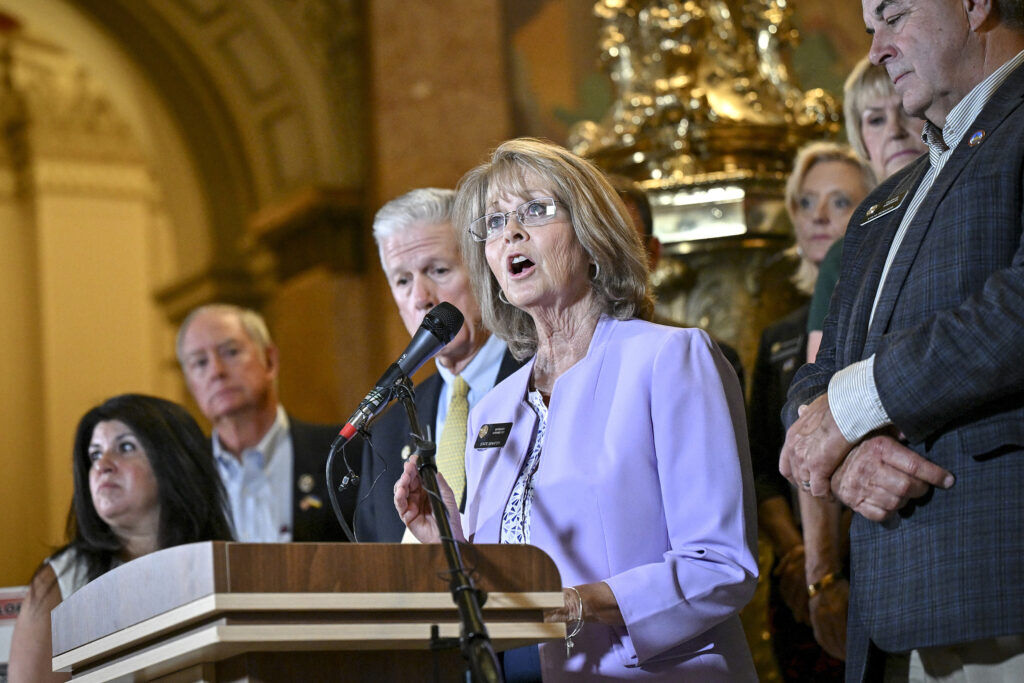
Kirkmeyer: Wasn’t it like a 1,000-page bill? I mean, I’m not in the habit of voting for budget bills without knowing what’s in them, just so you know. But the tax relief that was in that bill, absolutely, I would have been voting for. The holding states accountable with regard to how they administer entitlement programs? Yes, absolutely, states needs to be held accountable there. But I just want to be clear, on HR-1, it was really, to me, more about tax cuts. The Democrats had a huge issue with this, but they cut taxes at the federal level, which, in turn, because of our rolling conformity here at the state, cut taxes at the state (level). $1.2 billion.
My Democrat colleagues across the aisle, when they like to say things like, ‘We’ve got to get revenues up,’ that means they’re saying they want to increase taxes. So if you’re asking me, am I in support of the tax cut? Absolutely I am in support of cutting taxes. I did not vote for 25-1296, which put state income tax back on overtime pay. I did not vote for that, but I think pretty much all of our Democratic colleagues did — I think there might have been one that did not. But anyways, so would I have voted for those tax cuts? Absolutely. Those were tax cuts for individuals, for small businesses. They were extensions of tax breaks that were in place for seniors. Yes, I would have done that, just like I voted for and passed those two bills to cut property taxes and help out people with their property taxes in this state,
My Democrat colleagues across the aisle, when they like to say things like, ‘We’ve got to get revenues up,’ that means they’re saying they want to increase taxes. So if you’re asking me, am I in support of the tax cut? Absolutely I am in support of cutting taxes. — Barb Kirkmeyer
CP: Even some Republicans — Missouri Sen. Josh Hawley, for instance — have said that they were opposed to the $800 billion in Medicaid cuts over the next 10 years in HR-1, and want to reverse those cuts.
Kirkmeyer: First of all, I would challenge you to tell me exactly where the cuts are within HR-1with regard to benefits going to recipients, because in my looking at it, the cut to benefits to recipients is not present. It did not cut SNAP — the Supplemental Nutrition Program — benefits to recipients, and benefits to recipients were not cut to Medicaid, either. Our implementation costs at the state, that is something that they’re saying will have to increase if we can’t get our error rate down. And I’m like, I’m wondering why we aren’t working on getting our error rate down. We’ve known about it for years. It’s not like that just happened overnight.
So what the federal government is saying is, you know what, states, you’ve got to be able to manage these programs better. If you manage them and you get your error rate below 6%, you’re fine. You will be fine. There isn’t a cut. But quite frankly, that’s one of the fallacies that was coming out from our Democrat leadership and Democrats in the state saying that Medicaid and SNAP are cut. They’re not cut. They have not been cut. The benefits to recipients have not been cut.
CP: Coloradans say housing availability and affordability is a top concern, driving many other pressures on state residents — cost of living, the the feeling that it’s tough to get by in Colorado anymore. What what could you do as governor in your first year in office to to address that?
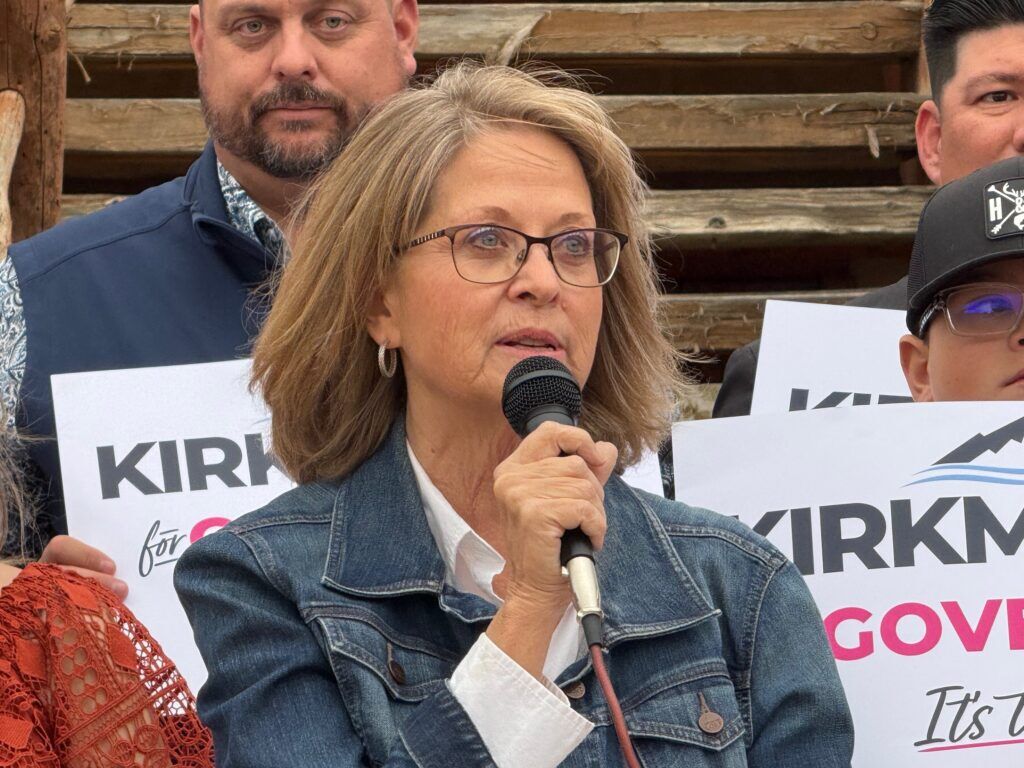
Kirkmeyer: You know what? This may sound a little crazy, but I’m going to go back to something that Gov. (Roy) Romer did. He started that whole ‘smart growth’ initiative, and instead of trying to preempt local governments or dictate to local governments how they deal with land use and what they do — because, I mean, affordable housing, attainable housing has been an issue for gosh, the last 20, 25 years, it’s not something new. But what he did was, and what I appreciated, was working with him in partnership.
And I did the same thing as a county commissioner — I went out with the 31 municipalities that are within Weld County and created intergovernmental agreements, started talking about, how do we partner together to actually solve this issue? It’s local governments who can solve this issue. It’s not the state legislature, i’s not the governor, centralizing everything down in Denver with his department heads making decisions about land use processes in local governments, in cities and counties.
That’s not how you solve it. You solve it in partnership with local governments. with the water districts, with the sanitation districts. You get them all to the table, and you start having those discussions about, how do we grow smartly? How do we start managing the affordable housing issue and the attainable housing issue in our state? How do we work together?
And you want to know what the best thing that came out of all of that was? It wasn’t so much that the state was leading the charge. The state was providing resources, but it was a platform for regional cooperation to happen that maybe wasn’t happening before that — you know, past county lines, from municipalities to counties, and making things work. That was really good.
So, again, it’s about partnering, not preempting local governments, but partnering with them to find the solutions and assisting them and the people who live in their communities to find the character of their neighborhoods, not the governor doing that. That’s not the governor’s role.
It’s about partnering, not preempting local governments, but partnering with them to find the solutions and assisting them and the people who live in their communities to find the character of their neighborhoods, not the governor doing that. — Barb Kirkmeyer
But I will tell you one thing that I did just in this last year that I believe will help with some of the growth issues that we have going on in our state, because that’s essentially what this is. The governor’s water quality control commission — it’s in there where they give the permits for wastewater treatment facilities, right? Like 75% of those were on an extended administrative permit, so, in other words, they weren’t adding capacity, and they weren’t building new capacity and sewer plants. You know, if you don’t have that capacity, you can’t build, you can’t get sewer permits, which means you can’t develop new homes. And that’s what they were doing in this state, kind of behind closed doors, behind the scenes, until I started putting a face to it. And we got a bill passed through the Joint Budget Committee that requires them to really work on getting that backlog down, getting those permits out the door, so that we can have wastewater treatment facilities that are not at capacity, that are meeting health standards like they need to meet, and that we can have growth.
Those are things that you can do as a as a governor. You can go in and look at the regulations that are in place and review those and start cutting back on these regulations. I mean, we’re the sixth-most regulated state in the nation. It’s not only hurting business, it’s hurting how we grow and how we develop in our state. That’s what the governor should be doing, cutting red tape, getting rid of those burdens, and listening to local governments on how we’re going to work
CP: Taking a look at what some other governors are looking at nationwide — in Florida, the public health department is lifting vaccine mandates for school children. Here in Colorado, would you support maintaining the requirements that school children have a certain set of vaccinations?
Kirkmeyer: You know, that’s not a question that I was necessarily prepared for. And you know, my general way of looking at things is, before I would make a decision that is that important, I would have to have a discussion with health people who actually know things that are going on, talk with the school districts, and have some discussions in this state about, how do we actually go about doing that, and if that’s something that we as a state wish to do. So it isn’t something that I would probably go just tackle on my own. I would look at it from a larger perspective, bring people in, build coalitions and talk about what’s the best way for our state to move forward.
CP: Do you keep up with your vaccines?
Kirkmeyer: Yeah.
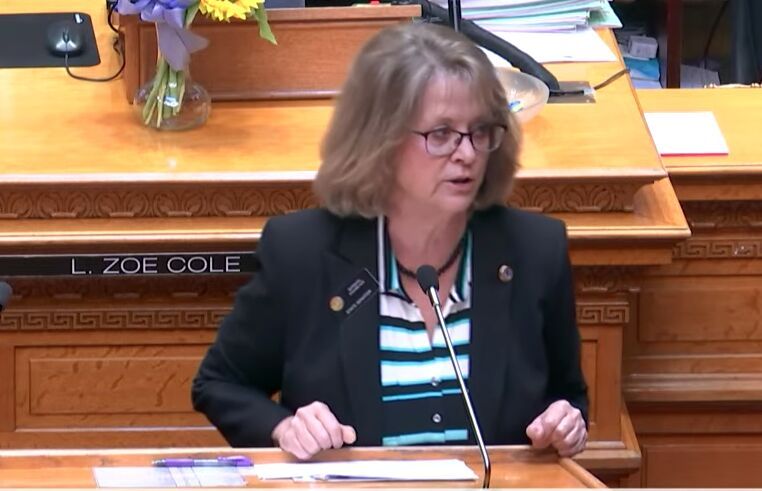
CP: The president recently said Chicago needs to get ready to confront what he’s calling the Department of War, and has talked about sending National Guard and active duty military troops into American cities, whether it’s to fight crime or back up deportation efforts. Would you welcome that in Denver when you’re governor?
Kirkmeyer: You know, here’s the thing. Well, first of all, the governor is not the mayor of Denver. So welcoming that into Denver, that would have to be a discussion that takes place with the mayor of Denver.
CP: But the governor commands the National Guard.
Kirkmeyer: So, here’s the thing — I’m open to the discussion. I’m for, how do we make Colorado a safe place? How do we save lives, reduce crime? We need to do more than just talk about it. We need to start walking it, you know? And you know, federalizing the Guard, to me, would be one of the last-resort things that we would look at, but, you know, my goal would be, as governor, we’re going to get dangerous criminals off the streets and out of our neighborhoods.
CP: A couple questions about your campaign. You’re a member of the Republican State Central Committee. Do you plan to vote for or against opting out of the semi-open primary at the central committee meeting later this month? You’ve voted on that several times before.
Kirkmeyer: Oh yeah, and my vote will remain the same. I’m against opting out. I believe that — well, I’m just against opting out.
CP: Do you plan to seek the nomination through the assembly or by petition, or is it too early to say?
You go knock on people’s doors, you talk to them, you tell them who you are, tell them what you want to do, and you ask them to sign your petition. That is a grassroots effort, to me. — Barb Kirkmeyer
Kirkmeyer: At this point, I’m going to leave all my options open, but I will tell you that for the last, I think, my last three or four races, I have gone the petition route, and I will be doing that again. Because that, to me, is the true grassroots effort out there, where you go out, you knock on people’s doors, you talk to them. And that’s how I do it. I don’t go stand in front of Safeway — I think I’ve done that once — but to me, it’s, you go knock on people’s doors, you talk to them, you tell them who you are, tell them what you want to do, and you ask them to sign your petition. That is a grassroots effort, to me. And so I’m going to take it back to the voters. The voters are the No. 1 grassroots folks there is, and so I’m going to take it to the voters and ask them to get me on the ballot.
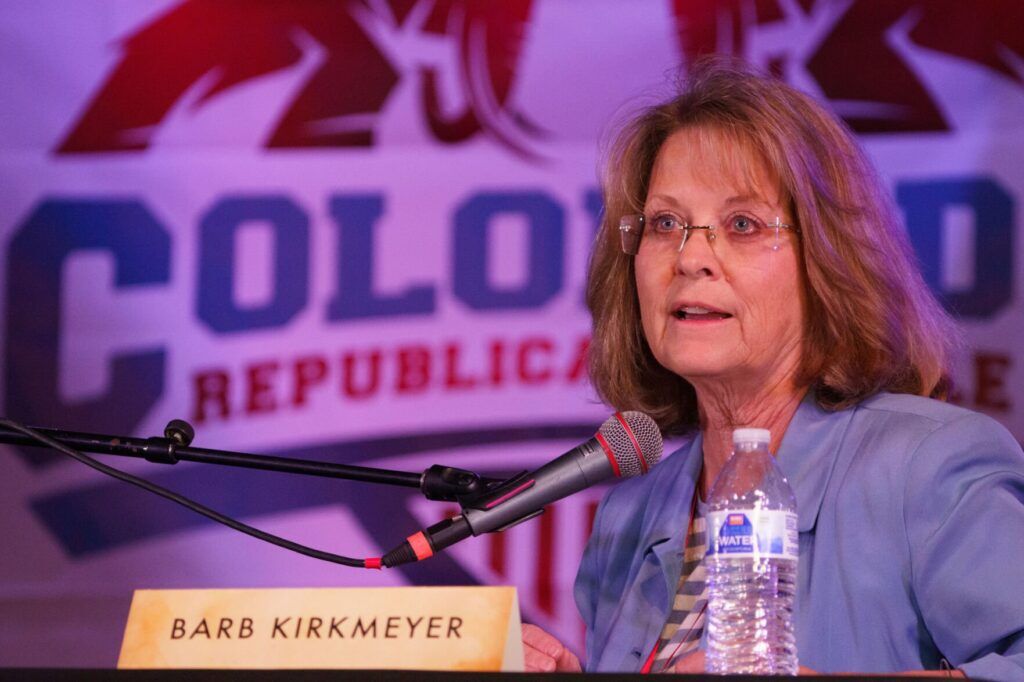
CP: Three years ago, you ran and lost one of the closest congressional races in the country. What’s going to be different this time?
Kirkmeyer: (laughs) Thank you for reminding me!
CP: You came awfully close in a good year for Democrats. But how is this going to be different from your congressional run?
Kirkmeyer: Running at a statewide level is different, and running at a state level is totally different than running at a federal level, where you’re talking about all the federal issues. And I know there’s going to be intersections between federal issues and state issues, and we have to collaborate and work together, but from my perspective, it is about working in the best interest of the people of Colorado. But here’s the thing, in the last — so it’ll be four years since that happened, you know, in 2022, where I lost by that very narrow margin — and it was close. I’m not ashamed of that race. I think I did a really good job —
CP: It could have gone either way.
Kirkmeyer: It could have. And I think what I’m hearing, especially here in the last few years, is people are hungry for a change. You know, we’re unaffordable, we’re unsafe, we are unraveling in this state. People are unhappy with government at every level in this state. I mean, that’s what I’m hearing when I’m out talking to folks.
I just came back from Grand Junction; the week before, I was down in Pueblo. I’ve been to Colorado Springs several times, been up to Greeley, Windsor, different places throughout the Front Range as well. People are unhappy with government pretty much at every level, and here in Colorado, one-party control has just taken us to that place of where people are just extremely unhappy, I believe. And from what I’ve seen and heard from folks, they truly believe that the state is going the wrong direction, on the wrong track, and that they want a change in leadership, and I think that’s what’s going to make the difference.
I think my experience — again, my accomplishments, what I’ve done, not only as a legislator. Just in the last five years, I’ve been on pretty much every major issue that the state has been facing, and worked with people across the aisle to get things done, to get tax relief, to get our budget balanced — to look at, how are we really, truly going to stabilize our safety net and our health care in this system, how we’re going to improve public safety? If you go back and look at what I did as a county commissioner, my local government experience, my business experience, I think will play into that.
I’m going to go out and talk to Republicans. I’m going to be a governor for everybody. I’m going to go talk to unaffiliates, and I’m going to go talk to Democrats. — Barb Kirkmeyer
But I’m going to go out and talk to Republicans. I’m going to be a governor for everybody. I’m going to go talk to unaffiliates, and I’m going to go talk to Democrats. You know, I went to the labor barbecue that they had in celebration of Labor Day, and I and I talked to them, and I reminded them all — because they were giving me a hard time there a little bit — but you know what, when you’re a governor, you’re supposed to be a governor for all people, and that means you go talk to those people that maybe don’t agree with you, and you start talking about where you can find common ground on things and what’s of interest to them and what’s important to them.
And it’s like I told them, because the head of the AFL-CIO came up to me, and he said, ‘I heard there was a Republican in the room,’ and I looked him and said, ‘I’m guessing there might be more than one of us.’ And I said, ‘Now I’m just going to remind you of all the legislators in the room, I’m the one who said we shouldn’t tax overtime pay. All those other legislators you’re going to give an award to tonight, they tax overtime pay. Just want to point that out.’
And so, you know, you’re a governor for all the people. And I think my background and what I’ve been able to accomplish working across the aisle down at the Capitol, and just even in the past, I think, shows that I’m very well-rounded, and I think it will appeal to people, and that’s what I’m going to do. I’m going to get out and talk to everybody that I can.


